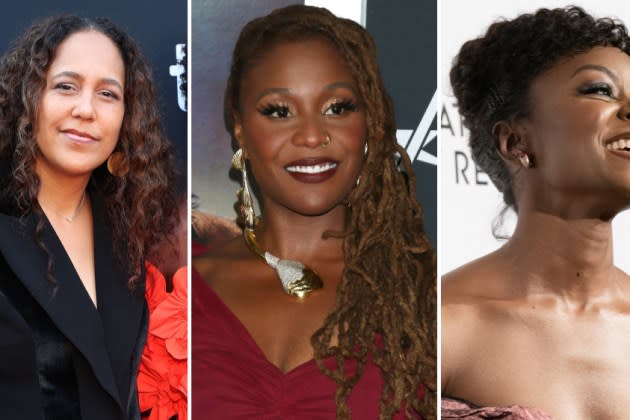Andrea Riseborough Isn’t the Reason Black Women Were Snubbed From Oscar Noms — The System Is
- Oops!Something went wrong.Please try again later.
- Oops!Something went wrong.Please try again later.

It’s not Andrea Riseborough’s fault that zero Black women were nominated for best actress this year. Still, with no such representation for the second consecutive year, the “To Leslie” star’s surprise inclusion is far more pronounced. Through a grassroots effort made up of predominantly white acting peers, Riseborough’s managing and publicity teams orchestrated a concentrated campaign that landed her a nom — and exposed an awards ecosystem that doesn’t naturally seek out Black women.
Viola Davis (“The Woman King”) and Danielle Deadwyler (“Till”) were favored to be best actress nominees — this in a category that has seen only one Black woman, Halle Berry, win in 95 years. After scoring key mentions from industry groups, neither contender received a nod. Alas, their snubs recall what Morpheus says in “The Matrix Reloaded” when gazing on his spaceship, the Nebuchadnezzar, exploding in flames: “I have dreamed a dream, but now that dream is gone from me.”
More from Variety
On the flip side of the equation, Riseborough’s nom typifies a system where white women can more easily attain the recognition they feel they deserve. Black women don’t have that luxury, nor can they feel so entitled.
The power disparity was apparent not only with Black actresses but also with Black filmmakers. Gina Prince-Bythewood, the director of “The Woman King,” was ubiquitous on the circuit, making film fest stops to rub shoulders with industry voters. Yet, even with credits like “Love & Basketball” (2000) under her belt, Prince-Bythewood’s labors were rewarded with a shutout of the Sony Pictures action epic that grossed more than $92 million globally.
When it comes to white directors, the legends of cinema — such as Steven Spielberg, a nominee for “The Fabelmans” — deservedly sit on the throne. Yet historically, white male filmmakers have been nurtured by the industry, given ample opportunities to develop and hone their craft. This has created a deep, exclusive bench of talent, ready to take up their positions when their time arises.
On the other hand, the advancement of female Black talent is not one of Hollywood’s priorities. In fact, when I encounter an exciting unknown Black filmmaking voice, I feel a dark cloud of uncertainty about when I will see their next venture.
Writer-director Nikyatu Jusu was a fresh face on the circuit with her indie horror film “Nanny,” which Amazon Studios acquired at the 2022 Sundance Film Festival. Yet, in addition to facing the hurdles of genre and gender bias, the Black debut filmmaker found her creative vision ignored by the Academy and major guilds.
“I trust my ability fervently,” Jusu tells Variety. “The challenges are herculean. I trust my ability fervently. I do not trust the system. The Oscars are nowhere near my center—never have been. However, we are navigating an industry that thrusts this very subjective, very hazy, very exclusionary barometer of supposed excellence on us in order to be perceived as ‘pedigreed’ or a serious artist. I never believed I was genuinely in contention for the Oscars, but the brazenness of omitting work from the talented black women around me this year is indicative of institutional racism and sexism. More people should familiarize themselves with the term misogynoir.”
With more than 50 acting credits, Riseborough assembled an arsenal of Oscar winners and luminaries (including Jane Fonda, Kate Winslet and Edward Norton), many of whom took to social media and hosted tastemakers to circulate buzz about an indie film that grossed about $28,000. In my 20 years covering the Oscar race, I’ve never witnessed such a concerted effort for a Black woman performer or director.
How many actors have publicly endorsed Black artists in the past decade, let alone this year? How many will support them in the future with the same passion they brought to Riseborough? While not intentional, the silence is deafening when two acclaimed performers are passed over because they don’t have enough A-list friends to “spread the word.”
More than 3,100 Oscar statuettes have been handed out in the past 95 years. Of those, only 18 were awarded to Black women. Isn’t it time there were more?
Best of Variety
40 Actors Who Should Have Oscar Nominations by Now: Hugh Grant, Oscar Isaac, Zendaya and More
SAG Awards Final Voting Closes: Why I'm Changing My Prediction for Best Actress
Oscars: Final Voting Opens for Five Days; What Surprising Winners Could be Lurking?
Sign up for Variety’s Newsletter. For the latest news, follow us on Facebook, Twitter, and Instagram.
